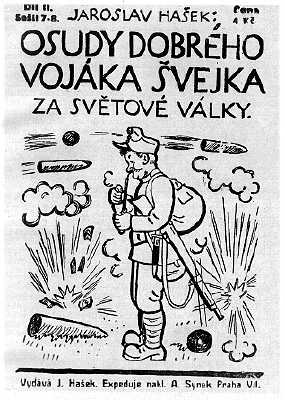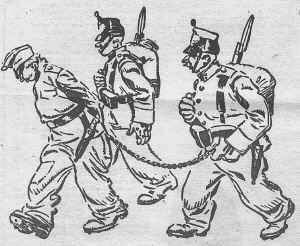One fact is undeniable: the "švejking" method has been so popular and successful that political, military, and intellectual leaders at times feel the need to openly decry it and those who are suspected of employing it. The novel that introduced this survival method to the world was banned from the Czechoslovak army in 1925, the Polish translation was confiscated in 1928, the Bulgarian translation was suppressed in 1935, and the German translation burned on Nazi bonfires in 1933. Gustáv Husák, the General Secretary of the Czechoslovak Communist Party who replaced the Prague Spring
reformer Alexander Dubček in that post after the 1968 Warsaw Pact invasion and occupation of Czechoslovakia,
and assumed the Presidency as well, exhorted the population in a speech during the 1970's period of the so-called "normalization"
to "STOP ŠVEJKING!!!"
|
Like Diogenes, Švejk lingers at the margins of an unfriendly society against which he is defending his independent existence. "Švejking" is the method for surviving "švejkárna", which is a situation or institution of systemic absurdity requiring the employment of "švejking" for one to survive and remain untouched by it.
|
|
BOOK VERSIONS
|
The original Czech text online
Osudy dobrého vojáka Švejka za světové války
|
|

|
|
The cover of the original edition
(Book Two, installment 7-8, price 4 Czech crowns)
Published by J. Hašek. Distributed by A. Synek Publishers, Prague 6.
|
|
|
List of Translations of the original
|
|
|
|
English
The first, abridged and bowdlerized translation by Paul Selver (1888 Mar 22 - 1970 Apr 9),
The Good Soldier Schweik
London, Heinemann, 1930
The second, first unabridged translation by Cecil Parrott,
The Good Soldier Švejk and his fortunes in the World War
New York, Thomas Y. Crowell Company, 1973
The latest translation by Zenny K. Sadlon and Emmett M. Joyce
The Fateful Adventures of the Good Soldier Švejk During the World War, Book One
1stBooks Library, 2000
Translations available online
|
An on-line Russian translation
(Похождения бравого солдата Швейка. Части 1,2)
(Books 1&2: Adventures of the Brave Soldier Švejk)
|
(Похождения бравого солдата Швейка. Части 3,4)
(Books 3&4: Adventures of the Brave Soldier Švejk)
|
|
|
An on-line Hungarian translation:
Eloszó
(Introduction)
Book One, A Hátországban
(In the Rear)
Book Two, A Fronton
(At the Front)
Book Three, A Dicsoséges Csihi-puhi
(The Famous Thrashing)
Book Four, A Dicsoséges Csihi-puhi Folytatása
(The Continuation Of The Famous Thrashing)
An on-line Esperanto translation:
|
|
La brava soldato Švejk,
1, 273 pages, 2.1 MB
|
|
La brava soldato Švejk,
2, 271 pages, 1.1 MB
|
|
La brava soldato Švejk,
3, 269 pages, 1.4 MB
|
La brava soldato Švejk,
4, 103 pages, 537 KB
|
|
back to »Contents
|
|
How the book was born: The two predecessors.
|
Dobrý voják Švejk a jiné podivné historky
(The Good Soldier Švejk and Other Strange Stories)
The original Švejk story published in 1911. Here the hero is a mere good-hearted, loyal Czech soldier and the "company numskull".

Karel Stroff's 1911 drawing
Karel Stroff (b. 1881 Kutná Hora
, Czech Lands
, Austria-Hungary
- d. 1929 Prague
, Czechoslovakia
) was a very well known Czech illustrator of the early 20th century. He studied first under E. K .Liska, and later, between 1899 and 1901 at the Prague Academy under Ženíšek. At last he was a student of F. Stuck in Munich, Germany. He produced work for the best Czech and German magazines.
|
An on-line text of the second predecessor of the famous book,
Dobrý voják Švejk před válkou
(The Good Soldier Švejk Before the War)
written by Hašek during the war when in Kiev in the Ukraine. Švejk is becoming rebellious and takes a stand against the Austro-Hungarian monarchy.
|
An on-line Russian translation of The Good Soldier Švejk Before the War
Бравый солдат Швейк перед войной
(The Brave Soldier Švejk Before the War)
A Spin-off Book Fragment
Arthur Koestler
recalls in his memoirs that in the summer of 1935 he "wrote about half of a satirical novel called The Good Soldier Schweik Goes to War Again.... It had been commissioned by Willy Münzenberg
[the Comintern's
chief propagandist in the West] ... but was vetoed by the Party on the grounds of the book's 'pacifist errors' " (The Invisible Writing: An Autobiography by Arthur Koestler [New York, 1954], p. 283).
|
A Spin-off Book
On
Yer Bike, Schweik!
Eric Davidson
Time Warner Paperbacks, London, December 9, 1993
|

|
|
"Based on the letters a father sends home to his family while serving from
Dunkirk to Monte Cassino, these 16 tales represent one man's experience of a
war. They concern the legion of botchers and bunglers who were doing their
noblest and best not to win the war." - amazon.co.uk
|
|